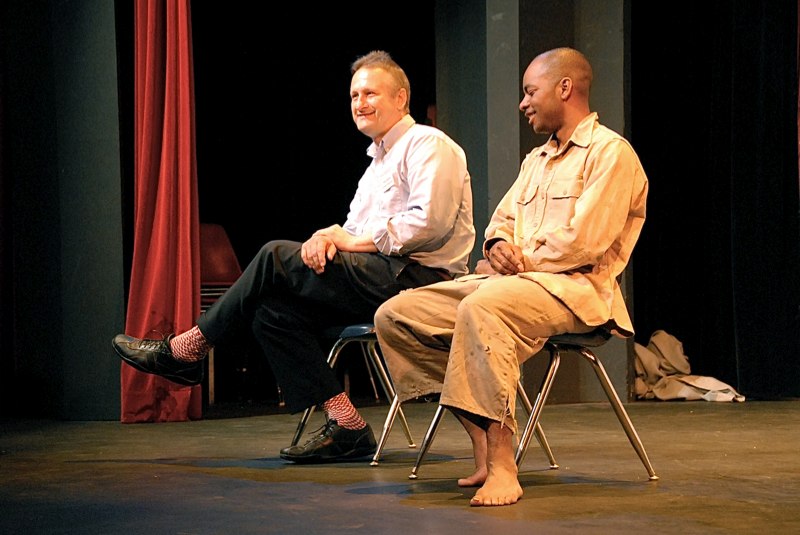
I sustain long term commitment to the politics of people, animals, and objects in intercultural settings, having been a member of the University of California Multicampus Research group in Intercultural Performance for many years. I am also committed to related issues through detailed embodied work with actors and actors and audiences, working constantly on how to connect the two.
I recently explored my interest in actor/audience relationality in a collaborative article on the work of the Japanese writer/theatre director Shogo Ota, whose work I have directed. We were exploring strategies that turn technique into technicity onstage, and comparing approaches taken by actors, directors and critics. As with most of my critical writing, this was accompanied by a production of Plastic Rose by Ota.
Through the support of a fellowship at the Interweaving Performance Cultures Institute at the Freie Universitat in Berlin, I have brought together my interests in Shogo Ota’s work with that of Tadeusz Kantor, and have written an article on how he approaches the concerns of body and text as a visual artist. I’m currently thinking through how, over time, the conditions of a production build a form that brings the actors and audience together enabling change.
The research moves extensively through practice into many areas of theatre and performance, and I focus on practice as research, particularly in intercultural settings that develop ways of attuning oneself to culturally specific needs. This is the emphasis of my recent essay on working with the Shanghai Dramatic Arts Center on Midsummer Night’s Dream. Over the last decade I have developed a relationship with the Shanghai Dramatic Arts Center, working with Chinese actors in generating relational strategies for modern spoken drama.
The interface between scholarly work and practice has also led to a co-authored article concerned with looking at the postdramatic in terms of elements that might just as well be considered pre-dramatic in terms of an in-depth dramatic study of an early seventeenth century text, written parallel with a production of a pre-Shakespearean play, Gallathea, by John Lyly.
Monographs and Edited Books
To find out more about my books, click on their respective links below.
- (2018) Shakespeare and Realism: On the politics of style.
- (2016) Sentient Performativities of Embodiment: Thinking alongside the Human.
- (2013) Performance, Politics and Activism: Scales of Production.
- (2009) Negotiating Shakespeare’s Language in ‘Romeo and Juliet’: Reading Strategies from Criticism, Editing and the Theatre
- (2009) Romeo and Juliet (Scholarly Edition)
- (2005) Shakespeare, Language and the Stage: The Fifth Wall, Issues in Practice and Criticism
- (2001) The Merchant of Venice: The Applause Shakespeare Library
Series Editor Books
- (2002) ‘Love me or kill me’: Sarah Kane and the theatre of extremes
- (2015) Directing scenes and senses: The thinking of Regie
- (2009 Making contemporary theatre: International rehearsal processes
- (2002) Negotiating cultures: Eugenio Barba and the intercultural debate
- (2012) Not Magic but work: An ethnographic account of a rehearsal process
- (2012) Performance in a time of terror: Critical mimesis and the age of uncertainty
- (2011) Performing Presence: Between the live and the simulated
- (2012) South African performance and archives of memory
- (2002) The Paris Jigsaw: Internationalism and the city’s stages
- (2013) The politics of Jean Genet’s late theatre: Spaces of revolution
- (2002) Theatre in Crisis?: Performance manifestoes for a new century
- (2004) Trans-global readings: Crossing theatrical boundaries
- (2010) World stages, local audiences: Essays on performance, place and Politics

Dramaturgy
As one of the few artistic directors working not only with new plays but also new writers of plays, I find dramaturgy a key way of thinking through a text and its immediate relations with all aspects of the theatre in its society.
See Dramaturgy to learn more about current and early work.
Articles
I write, often collaboratively, to bring the practice into a spoken experience. The process makes me reflect on what I do in practice, and articulate formally some of that work. The written form stays with me and when I move on to the next piece of directing I can use it to nourish the practice.
See Articles to view a full list.